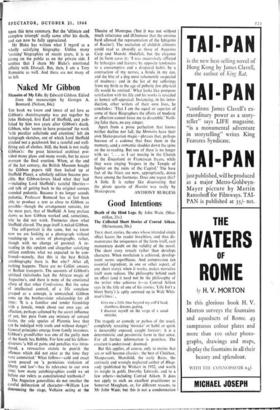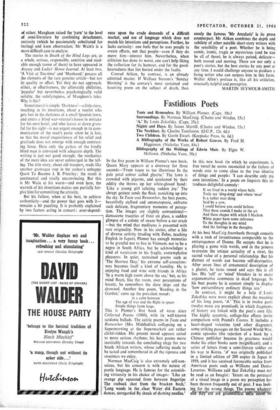Death of the Hind Legs. By John Wain. (Mac-
Good Intentions
millan, 21s.) .
The Collected Short Stories of Conrad Aitken. (Heinemann, 50s.) TRUE short stories, the ones whose intended single effect leaves the reader breathless, and thus de- monstrates the uniqueness of the form itself, cast momentary doubt on the validity of the novel. The short story reveals rather than develops character. When revelation is achieved, develop- ment seems superfluous. And compression (an essential ingredient, in one or other aspect, of any short story), when it works, makes narrative itself seem tedious. The philosophy behind such an effect (and it need not be the philosophy of the writer who achieves it—as Conrad Aitken says in the title of one of his stories, 'Life Isn't a Short Story') is aptly summed up in Walt Whit- man's lines : • Give me a little time beyond my cuff'd head, slumbers, dreams, gaping,
I discover myself on the verge of a usual mistake.
The tragedy or comedy or pathos of the usual, completely revealing 'mistake' or habit or quirk is inexorably exposed, caught forever: it is a deterministic and pessimistic form in that sense. For all further information is pointless. The creature is understood: doomed.
But this applies, of course, only to stories that are or will become classics : the best of Chekhov, Maupassant, Mansfield, the early Bates, the curiously and wrongly neglected author of Rhap- sody (published by Wishart in 1932, and worth its weight in gold), Dorothy Edwards, and to a few others—including Conrad Aitken. It does not apply to such an excellent practitioner as Somerset Maugham, or, for different reasons, to Mr John Wain; but this is oot a condemnation
of either. Maugham raised the 'yarn' to the level of semi-literature by combining detachment, curiosity (which he passionately substituted for feeling) and keen observation; Mr Wain's is a more difficult case to analyse.
The stories in Death of the Hind Legs are, as a whole, serious, responsible, sensitive and read- able enough (some of them) to have appeared in Argosy and Ladies' Home Journal. At least two, `A Visit at Tea-time' and 'Manhood,' possess all the elements of the rare genuine article—but not its quality or effect. Yet they do not approach, either, in effectiveness, the ultimately philistine, `popular' but nevertheless psychologically valid solidity, the satisfyingness, of Maugham's tales. Why is this?
Sometimes it is simple. 'Darkness'—a little story, touching in its intentions, about a tourist who gets lost in the darkness of a small Spanish town, and enters a blind war-veteran's house in mistake for his own hotel, and who leaves at dawn grate- ful for his sight—is not urgent enough in its com- munication of the man's panic when he is lost, so that the moral exquisiteness of his relief and gratitude does not emerge with enough contrast- ing force. Here only the pathos of the kindly blind man is conveyed with adequate depth. The writing is just not good enough; the mechanics of the mere idea are never submerged in the tell- ing. The title story, about old troupers, reads like another grotesque step in the author's unhappy Quest To Become J. B. Priestley : the result is sentimental and totally unconvincing. But this is Mr Wain at his worst—and even here, the warmth of his intentions makes one partially for- give him for committing the atrocity.
But his failure, when at his best, to achieve authenticity—and the power that goes with it— remains a bit puzzling. It is probably explained by two factors acting in concert: over-depend- ence upon the crude demands of a difficult market, and use of language which does not match his intentions and perceptions. Further, he lacks curiosity : one feels that he uses people to create effects, not that people—even if they do move him—interest him. Nevertheless, when criticism has done its worst, one can't help liking the collection for its humour, and for the good- heartedness that lies buried under the faults.
Conrad Aitken, by contrast, is an already admitted master. If Wallace Stevens's 'Sunday Morning' is the century's most sustained and haunting poem on the subject of death, then
surely the famous `Mr Arcularis' is its prose counterpart. Mr Aitken combines the depth and subtlety of other notable short-story writers with the sensibility of a poet. Whether he is being comic, ironic, tragic or mysterious (and he can be all of these), he is always poised, delicate— both moved and moving. These are not only a poet's stories, but the best stories by any poet at any time. I would challenge anyone to produce a living writer who can surpass him in this form. Walter Allen's preface is, like all his criticism, unusually helpful and perceptive.
MARTIN SEYMOUR-SMITH



































 Previous page
Previous page